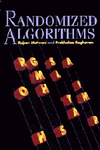随机算法 (Fall 2015)
This is the page for the class Randomized Algorithms for the Fall 2015 semester. Students who take this class should check this page periodically for content updates and new announcements.
Announcement
- (2015/9/6) 第一次课程slides已上传。
- (2015/9/22) Balls into bins 部分的slides已上传。
- (2015/9/25) 第一次作业已发布,10月9日上课收。
- (2015/10/29) 在蔡沛程同学的神勇帮助下,我们的课程网站服务器终于重新上线了!
- (2015/10/29) 10月30日周五的课,由于校运动会本科生和研究生课程都要停课,故再停课一次 -_-|||
- (2015/11/13) 讲义中关于随机图阈值现象的部分已经补齐。
- (2015/11/13) 第二次作业已发布,11月27日上课收。
- (2015/11/29) Lovasz local lemma 部分的讲义目前正在大幅度的改写,以反应algorithmic LLL的最新内容。写好之后会通知。
Course info
- Instructor : 尹一通,
- email: yitong.yin@gmail.com, yinyt@nju.edu.cn
- office: 计算机系 804.
- Class meeting: Friday 4pm-6pm, 仙I-206.
- Office hour: Tuesday 2-4pm, 计算机系 804.
Syllabus
先修课程 Prerequisites
- 必须:离散数学,概率论,线性代数。
- 推荐:算法设计与分析。
Course materials
成绩 Grades
- 课程成绩:本课程将会有若干次作业和一次期末考试。最终成绩将由平时作业成绩和期末考试成绩综合得出。
- 迟交:如果有特殊的理由,无法按时完成作业,请提前联系授课老师,给出正当理由。否则迟交的作业将不被接受。
学术诚信 Academic Integrity
学术诚信是所有从事学术活动的学生和学者最基本的职业道德底线,本课程将不遗余力的维护学术诚信规范,违反这一底线的行为将不会被容忍。
作业完成的原则:署你名字的工作必须由你完成。允许讨论,但作业必须独立完成,并在作业中列出所有参与讨论的人。不允许其他任何形式的合作——尤其是与已经完成作业的同学“讨论”。
本课程将对剽窃行为采取零容忍的态度。在完成作业过程中,对他人工作(出版物、互联网资料、其他人的作业等)直接的文本抄袭和对关键思想、关键元素的抄袭,按照 ACM Policy on Plagiarism的解释,都将视为剽窃。剽窃者成绩将被取消。如果发现互相抄袭行为, 抄袭和被抄袭双方的成绩都将被取消。因此请主动防止自己的作业被他人抄袭。
学术诚信影响学生个人的品行,也关乎整个教育系统的正常运转。为了一点分数而做出学术不端的行为,不仅使自己沦为一个欺骗者,也使他人的诚实努力失去意义。让我们一起努力维护一个诚信的环境。
Assignments
- Problem Set 1, due on Oct 9, Friday, in class.
- Problem Set 2, due on Nov 27, Friday, in class.
- Problem Set 3, due on December 18, Friday, in class.
Lecture Notes
- Identity Testing: checking matrix multiplication, polynomial identity testing, communication complexity | (slides)
- Fingerprinting: fingerprinting, the Karp-Rabin algorithm for pattern matching, primality testing | (slides)
- Balls and Bins: balls into bins model, birthday problem, perfect hashing, coupon collector problem, stable matching, occupancy problem | (slides)
- Min-cut: Karger's Min-cut algorithm | (slides)
- Moment and Deviation: Markov's inequality, Chebyshev's inequality, median selection, random graphs, threshold phenomenon | (slides)
- Universal Hashing: [math]\displaystyle{ k }[/math]-wise independence, universal hash families, perfect hashing | (slides)
- Randomized rounding: max-SAT, LP relaxation, randomized rounding | (slides)
- Lovász Local Lemma:
- Chernoff Bound: moment generating function, Chernoff bound, balls into bins, set balancing | (slides)
- Concentration of Measure: martingales, Azuma's inequality, Doob sequence, bounded difference method, Johnson-Lindenstrauss Theorem | (slides)
- Markov Chain and Random Walk: Markov chain, random walk, stationary distribution, convergence of Markov chain, hitting/cover time
The Probability Theory Toolkit
- Probability space and probability axioms
- Independent events
- Conditional probability
- Random variable and expectation
- Linearity of expectation
- The law of total probability and the law of total expectation
- The union bound
- Bernoulli trials
- Geometric distribution
- Binomial distribution
- Markov's inequality
- Variance and covariance
- k-wise independence
- The probabilistic method

